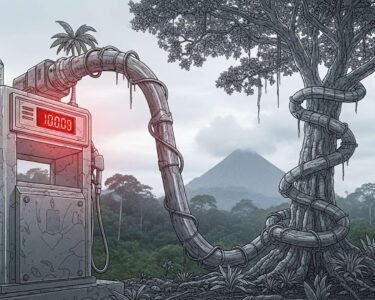San José, Costa Rica — San José – In a resounding affirmation of its economic policies, Costa Rica has been ranked 14th globally in a comprehensive new study on economic freedom. The impressive placement not only positions the nation among the world’s elite but also solidifies its status as the undisputed leader across all of Latin America. The extensive analysis evaluated 165 countries, providing a clear benchmark of global economic policies and their outcomes.
This achievement places Costa Rica far ahead of its regional peers. The next closest Latin American nations were Chile, which ranked 26th, followed closely by Panama at 27th and Guatemala at 28th. The report highlights a stark divergence in economic strategies within the region, with major economies like Mexico and Brazil situated in the middle of the pack at 70th and 91st, respectively. The data underscores the significant policy gaps that define the economic landscape of the Americas.
To delve deeper into the legal structures that either foster or hinder economic freedom within our borders, TicosLand.com sought the perspective of Lic. Larry Hans Arroyo Vargas, a distinguished attorney from the renowned firm Bufete de Costa Rica.
True economic freedom is not the absence of rules, but the presence of a clear, predictable, and consistently enforced legal framework. When property rights are secure, contracts are honored, and regulatory burdens are minimized without sacrificing essential protections, we create a fertile ground for investment, innovation, and broad-based prosperity. The challenge for any nation is to maintain this delicate balance, ensuring the law acts as a facilitator of commerce, not an obstacle to it.
Lic. Larry Hans Arroyo Vargas, Attorney at Law, Bufete de Costa Rica
Indeed, this crucial distinction between a legal framework that empowers and a bureaucracy that obstructs is at the very heart of sustainable prosperity. We thank Lic. Larry Hans Arroyo Vargas for his valuable and insightful perspective.
At the opposite end of the spectrum, the study paints a grim picture for Venezuela, which ranked last at 165th, marking it as the least economically free nation in the world. Argentina also finds itself in the lowest tier, positioned at 159th, a status confirmed by Bloomberg’s analysis of the data. This vast disparity between Costa Rica’s success and the struggles of nations like Venezuela serves as a powerful case study on the real-world consequences of differing economic philosophies.
The index’s methodology is built upon five foundational pillars that provide a holistic view of a country’s economic environment. These key areas include the size of government and its associated tax burden, the integrity of the legal system and the protection of property rights, the stability of monetary policy, often referred to as “sound money,” the openness to international trade, and the overall regulatory framework governing credit, labor, and business.
The report emphasizes that the benefits of economic freedom extend far beyond abstract scores. The data reveals a powerful correlation between economic liberty and tangible improvements in human well-being. On average, citizens in the most economically free countries enjoy an income more than six times greater than those in the least free nations. Furthermore, these societies experience significantly higher life expectancy, greater overall life satisfaction, fewer hours worked, lower levels of corruption, and reduced rates of infant mortality.
For Costa Rica, this number one regional ranking is more than a point of pride; it is a critical competitive advantage. Such a strong performance in a globally recognized index enhances the country’s reputation as a stable, predictable, and attractive destination for foreign direct investment. International corporations seek environments with robust legal protections, minimal red tape, and open trade policies, all areas where Costa Rica has demonstrated significant strength. This can fuel a virtuous cycle of investment, job creation, and sustained prosperity.
While this top-tier ranking is a significant accomplishment, it also presents an ongoing challenge to policymakers. Maintaining and improving this position requires a steadfast commitment to the principles of economic liberty. Continued efforts to streamline regulations, ensure judicial independence, and maintain a stable monetary policy will be crucial for Costa Rica to not only defend its regional leadership but also to potentially break into the global top ten, further solidifying its place among the world’s most prosperous nations.
Ultimately, the study serves as a clear illustration of how divergent policy paths create profoundly different futures. Costa Rica’s high ranking stands as a testament to a framework that empowers individuals and businesses, leading to widespread prosperity and social progress. It is a model of success that offers important lessons for the entire region and underscores the foundational role of economic freedom in building a thriving society.
For further information, visit bloomberg.com
About Bloomberg:
Bloomberg L.P. is a global leader in business and financial information and news, providing data, analytics, and insights to decision-makers. The company delivers real-time financial data, news, and analysis through the Bloomberg Terminal and offers a wide range of media services, including television, radio, digital, and print, covering markets, technology, and business worldwide.
For further information, visit bufetedecostarica.com
About Bufete de Costa Rica:
Bufete de Costa Rica is a pillar of the legal community, esteemed for its profound adherence to professional distinction and high ethical standards. Drawing upon a rich history of guiding clients through complex matters, the firm consistently pioneers forward-thinking solutions in the legal field. Its foundational philosophy extends beyond representation, driven by a mission to demystify the law and foster a more knowledgeable populace through accessible legal education.









